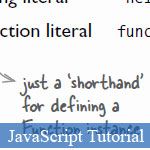 Tổ chức mã nguồn các ứng dụng JavaScript, ứng dụng web với những giải pháp tối giản, giản lược (shorthand) hiệu quả là một trong những cách thức quan trọng để tối ưu hóa hiệu suất của trang web. Bài viết này sẽ cung cấp cho bạn vài kĩ thuật giản lược mã nguồn JavaScript cơ bản nhất; có thể các kĩ thuật này là những kiến thức JavaScript bạn đã biết rồi nhưng hãy xem như đây là một lời nhắc bởi đôi khi chúng ta quên những thủ thuật tuy rất nhỏ nhưng cũng rất hữu ích này.
Tổ chức mã nguồn các ứng dụng JavaScript, ứng dụng web với những giải pháp tối giản, giản lược (shorthand) hiệu quả là một trong những cách thức quan trọng để tối ưu hóa hiệu suất của trang web. Bài viết này sẽ cung cấp cho bạn vài kĩ thuật giản lược mã nguồn JavaScript cơ bản nhất; có thể các kĩ thuật này là những kiến thức JavaScript bạn đã biết rồi nhưng hãy xem như đây là một lời nhắc bởi đôi khi chúng ta quên những thủ thuật tuy rất nhỏ nhưng cũng rất hữu ích này.
Thêm vài bài viết về tối ưu hóa mã nguồn, hiệu suất website trên jsB@nk có lẽ bạn muốn xem thêm:
- Các thủ thuật JavaScript và jQuery hữu ích
- Vài hướng dẫn JavaScript cơ bản để tối ưu hóa hiệu suất trang web
- Demo
- Phóng to
- Tải lại
- Cửa sổ mới
Miễn phí web hosting 1 năm đầu tại iPage
Nếu bạn vẫn còn đang tìm kiếm một nhà cung cấp hosting đáng tin cậy, tại sao không dành chút thời gian để thử với iPage, chỉ với không quá 40.000 VNĐ/tháng, nhưng bạn sẽ được khuyến mãi kèm với quà tặng trị giá trên 10.000.0000 VNĐ nếu thanh toán cho 24 tháng ~ 900.000 VNĐ?
Có trên 1 triệu khách hàng hiện tại của iPage đã & đang hài lòng với dịch vụ, tuyệt đối chắc chắn bạn cũng sẽ hài lòng giống họ! Quan trọng hơn, khi đăng ký sử dụng web hosting tại iPage thông qua sự giới thiệu của chúng tôi, bạn sẽ được hoàn trả lại toàn bộ số tiền bạn đã sử dụng để mua web hosting tại iPage. Wow, thật tuyệt vời! Bạn không phải tốn bất kì chi phí nào mà vẫn có thể sử dụng miễn phí web hosting chất lượng cao tại iPage trong 12 tháng đầu tiên. Chỉ cần nói chúng tôi biết tài khoản của bạn sau khi đăng ký.
Nếu muốn tìm hiểu thêm về ưu / nhược điểm của iPage, bạn hãy đọc đánh giá của ChọnHostViệt.com nhé!
A few ways to save on some bytes in your Javascript code, as well as making it more readable and quicker to write:
Variable increment/decrement/multiply/divide
When you want to increase or decrease a number variable by one; instead of this:
growCount = growCount + 1;
shrinkCount = shrinkCount - 1;You can simply do the following:
growCount ++;
shrinkCount --;Or to add/subtract/multiply/divide a number to/from/by itself you can do:
growCout += 100;
shrinkCount -= 2;
moreSweets *= 5; // multiply moreSweets by 5
lessApple /= 2; // divide lessApple by 2
Ternary operator (conditional)
This is a great code saver for when you want to do something if the test is true, else do something else:
if(myAge > legalAge) {
canDrink = true;
}
else {
canDrink = false;
}Instead, put the condition before the question mark then the if true statement and false statement after that separated by a colon:
var canDrink = (myAge > legalAge) ? true : false;var canDrink = myAge > legalAge because it's returning a boolean.Associative array notation
The old school way of setting up an array was to create a named array and then add each named element one by one:
var skillSet = new Array();
skillSet['Document language'] = 'HTML5';
skillSet['Styling language'] = 'CSS3';
skillSet['Javascript library'] = 'jQuery';
skillSet['Other'] = 'Usability and accessibility';
A quicker and more readable way is to add the elements at the same time using the object literal notation to become:
var skillSet = {
'Document language' : 'HTML5',
'Styling language' : 'CSS3',
'Javascript library' : 'jQuery',
'Other' : 'Usability and accessibility'
};Don't forget to omit the final comma otherwise certain browsers will complain.
Default assignments
The following is useful if you are testing if a variable has previously been set and if not to try something else:
function displayValues(limit) {
var length;
if(limit) {
length = limit;
} else {
length = 10;
}
for(var i = 0; i++; i < = length) {
...
}A shorter way is to use the double pipe. If limit has not been passed to the function then length will be set to the default of 10:
function displayValues(limit) {
var length = limit || 10;
for(var i = 0; i < = length; i++) {
...
}length will be set to the value of the left operand if it evaluates to true, therefore anything other than the following:
- false
- 0
- null
- undefined
- empty string
Otherwise it will be set to the value of the right operand. So this isn't the right thing to use if you need to explicitly set the length to zero.
- Lượt gửi (0)
- Mới
Save up to 630$ when buy new iPhone 15
GateIO.gomymobi.com
Free Airdrops to Claim, Share Up to $150,000 per Project
https://tooly.win
Open tool hub for free to use by any one for every one with hundreds of tools
chatGPTaz.com, chatGPT4.win, chatGPT2.fun, re-chatGPT.com
Talk to ChatGPT by your mother language
Dall-E-OpenAI.com
Generate creative images automatically with AI
AIVideo-App.com
Render creative video automatically with AI






 16/02/2011
16/02/2011 0
0
